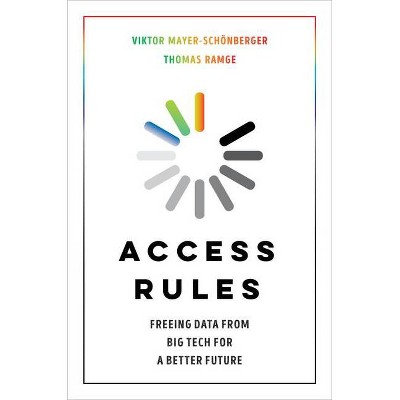Sponsored

Guardrails - by Urs Gasser & Viktor Mayer-Schönberger
$18.58Save $9.37 (34% off)
In Stock
Eligible for registries and wish lists
Sponsored
About this item
Highlights
- How society can shape individual actions in times of uncertainty When we make decisions, our thinking is informed by societal norms, "guardrails" that guide our decisions, like the laws and rules that govern us.
- About the Author: Urs Gasser is professor of public policy, governance, and innovative technology and dean of the School of Social Sciences and Technology at the Technical University of Munich.
- 240 Pages
- Social Science,
Description
About the Book
"In making decisions-be they decisions for ourselves, our families, our work, or our government-our thinking is informed by a host of factors that include the information we have on hand, the societal norms exerting pressure in one direction or another, the laws that govern us, and, increasingly, the technology that can bring the power of algorithms, AI, and computing to our aid. Viktor Mayer-Schèonberger and Urs Gasser term this overarching set of external influences "guardrails": the structures, much like the same-named barriers on highways, that establish the bounds and direction of desirable behavior. As technology has come to play an outsized role in shaping our decision-making, the authors argue that a clear understanding of what role guardrails can and should play in our society is essential-and that this in turn can help us determine what kind of transparency and accountability we require of the technology we rely on. The authors first consider some of the challenges of decision-making in the digital world in chapters that focus on information and misinformation, human bias and the promise (or not) of AI to correct it, and decision-making in the face of uncertainty. In each case, they show how the quick embrace of technological solutions can lead to results we don't expect or hope for (for instance, the perpetuation of racial discrimination in the algorithmic assessment of credit-worthiness). They then lay out what they see as the key principles for good guardrails-empowering individual decisions, accounting for the social good, and flexibility in the face of new circumstances. Ultimately, the authors present a vision for the future of decision-making that centers individual choice and human volition even in face of technological progress"--Book Synopsis
How society can shape individual actions in times of uncertainty
When we make decisions, our thinking is informed by societal norms, "guardrails" that guide our decisions, like the laws and rules that govern us. But what are good guardrails in today's world of overwhelming information flows and increasingly powerful technologies, such as artificial intelligence? Based on the latest insights from the cognitive sciences, economics, and public policy, Guardrails offers a novel approach to shaping decisions by embracing human agency in its social context. In this visionary book, Urs Gasser and Viktor Mayer-Schönberger show how the quick embrace of technological solutions can lead to results we don't always want, and they explain how society itself can provide guardrails more suited to the digital age, ones that empower individual choice while accounting for the social good, encourage flexibility in the face of changing circumstances, and ultimately help us to make better decisions as we tackle the most daunting problems of our times, such as global injustice and climate change. Whether we change jobs, buy a house, or quit smoking, thousands of decisions large and small shape our daily lives. Decisions drive our economies, seal the fate of democracies, create war or peace, and affect the well-being of our planet. Guardrails challenges the notion that technology should step in where our own decision making fails, laying out a surprisingly human-centered set of principles that can create new spaces for better decisions and a more innovative and prosperous society.Review Quotes
"Guardrails is meticulously researched, insightful and cleanly argued."---Jeffrey Mazo, Survival: Global Politics and Strategy
"An impressively detailed and useful book that is also short, fascinating, and readable. . . . I have never before encountered so much clarity about the full context of governance and how all its components relate to AI."---Joanna Bryson, Science
About the Author
Urs Gasser is professor of public policy, governance, and innovative technology and dean of the School of Social Sciences and Technology at the Technical University of Munich. His books include (with John Palfrey) Born Digital: How Children Grow Up in a Digital Age. Viktor Mayer-Schönberger is professor of internet governance and regulation at the University of Oxford. His books include Delete: The Virtue of Forgetting in the Digital Age (Princeton).Dimensions (Overall): 9.3 Inches (H) x 6.0 Inches (W) x 1.3 Inches (D)
Weight: 1.1 Pounds
Suggested Age: 22 Years and Up
Number of Pages: 240
Genre: Social Science
Publisher: Princeton University Press
Format: Hardcover
Author: Urs Gasser & Viktor Mayer-Schönberger
Language: English
Street Date: March 5, 2024
TCIN: 90820429
UPC: 9780691150680
Item Number (DPCI): 247-47-5765
Origin: Made in the USA or Imported
If the item details aren’t accurate or complete, we want to know about it.
Shipping details
Estimated ship dimensions: 1.3 inches length x 6 inches width x 9.3 inches height
Estimated ship weight: 1.1 pounds
We regret that this item cannot be shipped to PO Boxes.
This item cannot be shipped to the following locations: American Samoa (see also separate entry under AS), Guam (see also separate entry under GU), Northern Mariana Islands, Puerto Rico (see also separate entry under PR), United States Minor Outlying Islands, Virgin Islands, U.S., APO/FPO
Return details
This item can be returned to any Target store or Target.com.
This item must be returned within 90 days of the date it was purchased in store, shipped, delivered by a Shipt shopper, or made ready for pickup.
See the return policy for complete information.











